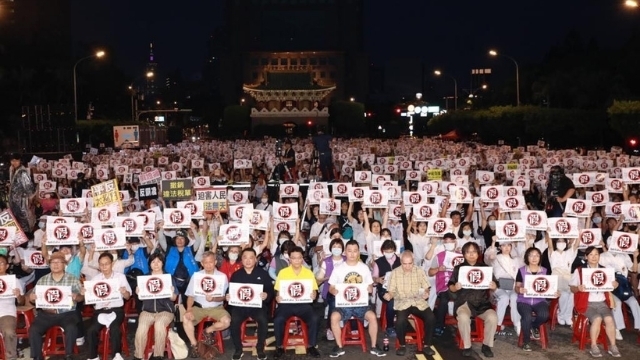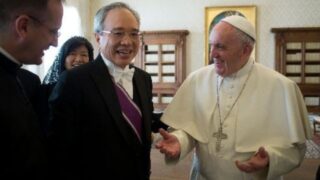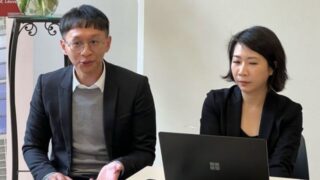What happened in Taiwan is important for economists too. It shows exactly how a tax system, confronted with spiritual movements, should not operate.
by Pier Marco Ferraresi


I am a professional economist, and I lecture on Microeconomic and Macroeconomic Scenarios at the University of Turin, Italy. My research field is mainly Public Economics—and that is the reason because the case of Tai Ji Men raised my attention, and left me astonished.
From the point of view of an economist, as I am, I see this as a sad page in the history of Taiwan, a page where the National Taxation Bureau made itself the instrument of a political and religious persecution.
I have no elements to say that the taxation system in Taiwan is persecutory or unjust in itself. Likely, it is worse with respect to some systems in the world, and maybe better than others. However, the way the rule of law was broken in the case of Tai Ji Men is bad news for the economy as a whole, since any economy always requires a certain degree of consistency in the application of tax rules and of court decisions.
My opinion, in general, is that nearly all tax systems, whenever they are used as persecutory tools against a specific target, are unfortunately particularly effective. This is due to several reasons, some of which I will try to explain in what follows.
We must recognize that tax policy is a very delicate subject. Within the tax system may lurk the most insidious threats to individual liberty, mainly due to three reasons.
First, tax levy directly turns the revenue of an individual’s work from the legitimate purposes of the taxpayer to the ones of the administrative authorities, which are not necessarily the same.
Second, whenever government intervention within the economy expands, so does the tax burden. That frequently happens slowly and undetectably, to the point where even a small change of tax policy greatly affects economic and family decisions, and you realize you have been traveling, unaware of, a road to serfdom.
Third, tax persecutions, or even simply the Taxation Bureau’s mistakes, are difficult to be corrected, since, once initiated, they have a sort of “administrative inertia.” There are many reasons for that, one of them being that this kind of administration usually acts on a year-by-year logic, and is blind to the lack of consistency of its actions across the years.
The Tai Ji Men’s case is a clear example of all these points. In 2007, the criminal division of the Supreme Court ruled that Tai Ji Men was not guilty of tax evasion or any other charges, and Tai Ji Men did not owe any tax. The administrative courts have ruled in favour of Tai Ji Men repeatedly. After 22 years since the onset of the case, in 2018, the Supreme Administrative Court ruled in favour of the movement again, stating that Tai Ji Men is a menpai (similar to a school) of qigong, martial arts, and self-cultivation. In the context of a menpai, the nature of the shifu–dizi (master-disciple) traditional relationship, and the nature of the gifts given by the disciples to their master as a token of respect for him, have both been recognized by the state authorities.
The monetary gifts in the form of “red envelopes” given by the Tai Ji Men dizi (disciples) to their shifu (spiritual master) were gifts indeed, as such tax-exempt, and were not tuition fees in a so-called cram school. The Supreme Administrative Court also mentioned that a court decision on the 1992 Tai Ji Men tax bill had not considered the conclusion of the previous criminal case, that the red envelopes for the master were gifts, and the new fact and evidence that the National Taxation Bureau itself had recognized that Tai Ji Men is not a cram school. These facts prove that the tax bill and court decision concerning the year 1992 were illegal and wrong. However, the “administrative inertia” in the end still left alive the claims by the National Taxation Bureau for the year 1992, even if this runs against the Supreme Administrative Court decision. On that erroneous basis, properties belonging to the movement’s founder, Dr. Hong Tao-tze, were auctioned and confiscated in 2020—a clear disruption of the rule of law.
Tax persecutions frequently involve elements that are too complicated to be quickly explained and easily understood by the general public, and that makes difficult the action of human rights organizations.


The bad news for tax justice is that the National Taxation Bureau revealed itself in the case of Tai-Ji Men as an instrument of certain politicians and bureaucrats to carry out a persecution against a legitimate spiritual movement. In fact, such a persecution was also put in place with other even more invasive instruments, such as the preventive arrests of Dr. Hong, his wife, and some dizi, and the preventive freezing of its leaders’ assets. But, as mentioned earlier, the tax persecution was lengthier and more difficult to be stopped.
I think the movement must be supported, and its leaders and members must be recognized and praised for having been strong and not wanting to settle even on the last unjust tax claim for 1992. To admit a violation would have meant to declare that they had done something illegal, and contrary to the very founding principles of their movement. Ultimately, a settlement would have given the victory to the persecutors.
Taiwan is not a member state of the United Nations, but this case needs the attention and support of more international human rights organizations to push the Taiwan government and officials to both immediately resolve the case and reform its tax system to make sure that its persecutory use is not repeated in the future.
I am an economist rather than an international lawyer, but I sincerely admire the perseverance of Tai Ji Men in continuing their battle on political and cultural grounds, and of those who try to inform the world about a case that is important for economists as well. I would like to call on the international community to condemn those who have caused such gross human rights violations against Tai Ji Men, and I hope that all cases of persecution against religious or spiritual movements through taxation, by any government in the world, will cease.









